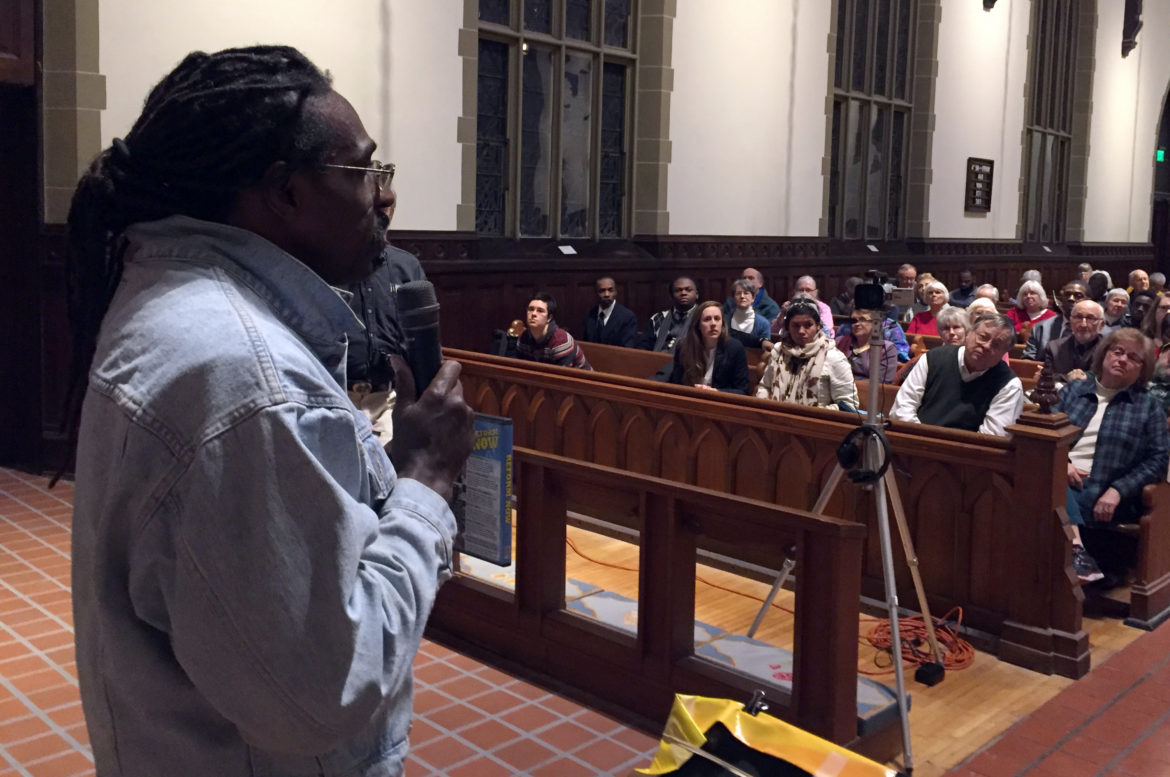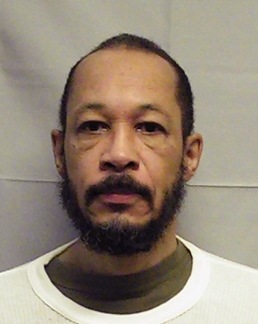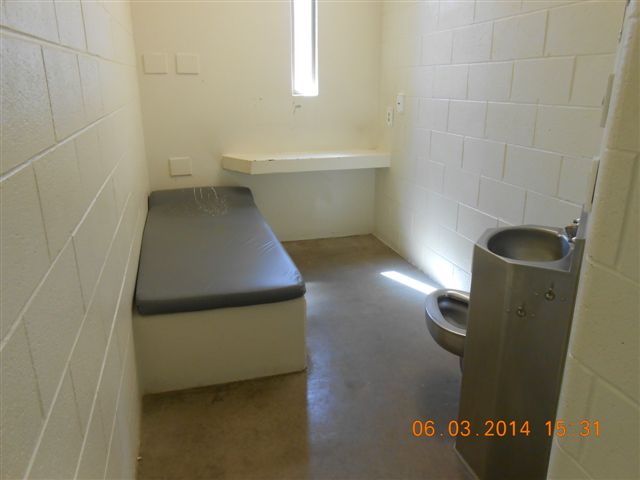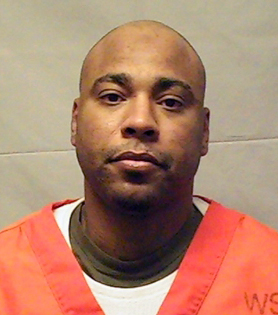Hunger Strike Against Solitary Confinement
Some states banned it but not Wisconsin. Waupun inmates plan strike beginning June 10.

Talib Akbar, who spent several years in solitary confinement in Wisconsin prisons, speaks during a Feb. 4 listening session in Madison sponsored by Wisdom, a statewide faith-based prison advocate group. “Believe me it was torture. When you are released, you are dysfunctional.” Photo by Dee J. Hall of the Wisconsin Center for Investigative Journalism.
About a dozen Wisconsin prisoners plan to launch a hunger strike beginning next week aimed at ending a form of indefinite solitary confinement that officials use to keep order in the institutions, according to an inmate advocacy group.

LaRon McKinley Bey has sued the Wisconsin Department of Corrections, alleging his 25 years in a form of solitary confinement constitutes cruel and unusual punishment. Photo courtesy of the Wisconsin Department of Corrections.
One Wisconsin prisoner, LaRon McKinley Bey, says he has been held in this “non-punitive” administrative confinement status for at least 25 years. McKinley Bey sued the state Department of Corrections in April, alleging that the long-term isolation has created or exacerbated mental illness among prisoners, including himself.
Ben Turk, with the Industrial Workers of the World in Milwaukee, said the effort is set to begin June 10 and is based at Waupun Correctional Institution but could spread to other prisons. The push will include rallies in Madison and Milwaukee, an online petition and a letter writing campaign, according to IWW, a worker advocacy group whose activities include supporting the rights of prisoners.
“The overarching demand is to end administrative confinement — to not allow long-term solitary confinement,” Turk said.
In addition, the prisoners are asking for a one-year limit on stints in solitary, also known as restrictive housing; increased oversight of the state’s use of isolation; improved mental health treatment for inmates in solitary; and a federal investigation into what some prisoners describe as a “mind control program.”
As of late April, 116 Wisconsin prisoners were held in administrative confinement, DOC spokesman Tristan Cook said. Such confinement is used for inmates who pose a threat to staff, self or other inmates or the “security or orderly running of the institution.”
Cook said the agency is aware of the planned hunger strike and “will continue to evaluate and monitor the situation to ensure the health and safety of inmates.”
In June 2015, the state Department of Corrections reduced the maximum stint in solitary confinement for violating prison rules from 360 days to 90 days, with longer stints possible under certain circumstances.
But those limits do not apply to inmates deemed to be violent or hard to manage who are in administrative confinement — a form of isolation that can go on for years, even decades. The status of each inmate in administrative confinement is reviewed every six months, but McKinley Bey charges in his lawsuit that those reviews are a “sham.”
Colorado has banned the use of such indefinite solitary confinement, as has California, which agreed to end it after a legal challenge and a large hunger strike.
In his handwritten lawsuit, McKinley Bey said he is held in a small cell at Waupun for four days a week, 23 hours a day. The other three days a week, McKinley Bey stays in the cell, for 24 hours alone, with meal trays slid through a slot in the door.
Contact with other people consists mostly of correctional officers who take him shackled to and from the shower and recreation in an indoor caged area or occasional sessions with mental health staff. Visits are done remotely by video screen.
McKinley Bey’s description of conditions in administrative confinement matches that of Cesar DeLeon, another Waupun prisoner who plans to participate in the hunger strike. Both say they are never allowed to go outside.

Inmates can spend years, even decades, in a cell like this one at Waupun Correctional Institution under so-called administrative confinement. Colorado and California have eliminated the use of such indefinite solitary confinement. Photo courtesy of Wisconsin Department of Corrections.
Constitutional challenge
In his lawsuit filed in U.S. District Court in Milwaukee, McKinley Bey charges long-term solitary confinement violates the U.S. Constitution’s Eighth Amendment prohibition against cruel or unusual punishment. He cited a lack of “meaningful human contact” and “severe environmental and social isolation” and no “bright-line” criteria for how to get back to the general prison population.
McKinley Bey also alleges in the suit that officer Joseph Beahm — whom he and two dozen other inmates at Waupun have accused of physical and psychological abuse — repeatedly subjected him and the other prisoners in administrative confinement to cold showers in November 2015. In 2014, a federal jury rejected an earlier lawsuit by McKinley Bey alleging that Waupun correctional officers, including Beahm, had mistreated him.
In his latest complaint, McKinley Bey argues he and other inmates in administrative confinement are suffering from a syndrome caused by prolonged solitary confinement.
Former Harvard Medical School psychiatrist Dr. Stuart Grassian, in a 2006 Washington University Journal of Law and Policy paper, “Psychiatric Effects of Solitary Confinement,” wrote that prisoners held in long-term isolation can develop a “delirium” that includes decreased alertness, fearfulness, paranoia and agitation and random, impulsive and self-destructive behavior.
The Department of Corrections has not yet responded to McKinley Bey’s latest suit. A message seeking comment on the suit was not returned.
History of violence

LaRon McKinley was placed in administrative confinement after this 1987 escape in Madison in which he shot a Milwaukee County Sheriff’s deputy. Another deputy was injured while leaping from the squad car in which the three were riding. Photo courtesy of the Wisconsin State Journal.
Self-described as “one of the most dangerous people in prison,” McKinley Bey is serving a 262-year sentence for crimes including robbing and tying up two elderly Madison women in their homes in 1984, and a 1987 escape in which he shot a sheriff’s deputy and another was injured.
McKinley Bey, who added the name “Bey” after he was imprisoned, continues to be held in isolation because he is considered a threat to the institution after several violent encounters with staff and inmates, according to records from his unsuccessful 2013 lawsuit against the department. Most recently, he was convicted in Dodge County Circuit Court in 2014 with a felony for throwing feces on a Waupun correctional officer.
One clinician who examined McKinley Bey in connection with that case concluded he is a sociopath — a condition known as antisocial personality disorder which is difficult to treat.
Psychologist Brooke Lundbohm of Behavioral Consultants Inc., said McKinley Bey has demonstrated a “long pervasive history of antisocial behaviors and attitudes for which he has been imprisoned throughout much of his adult life.” However, Lundbohm concluded McKinley Bey understood the wrongfulness of his actions when he threw waste on the officer.
McKinley Bey’s long stint in administrative confinement began after a 1987 incident in which he convinced a female Milwaukee County sheriff’s deputy to smuggle a gun to him in jail that he used to escape during a transfer to Dane County. According to news reports, he shot a Milwaukee County sheriff’s deputy; a second deputy was injured when he jumped out of the squad car in which all three were riding.
Milwaukee County was ordered to pay $5.3 million to the two injured deputies. The deputy who smuggled the gun was sent to prison.
McKinley Bey is not the only prisoner claiming long-term administrative confinement is cruel.

Waupun Correctional Institution prisoner Norman C. Green, who also calls himself Prince Aturn-Ra Uhuru Mutawakki, has been in a version of solitary confinement in Wisconsin for 18 years. In a 2012 blog post he said long-term isolation“incinerates the mind and spoils the soul.” Photo courtesy of the Wisconsin Department of Corrections.
Waupun inmate Norman C. Green, who also calls himself Prince Aturn-Ra Uhuru Mutawakkil, said he has been in solitary in Wisconsin for about 18 years. He described his long-term isolation in a 2012 blog post as “a holocaust” that “leaves the body static but alive” but “incinerates the mind and spoils the soul.”
Prisoner advocate Peg Swan of Blue River said she has found it difficult to generate sympathy for inmates in administrative confinement, some of whom are suffering from severe mental illness.
“I think it’s the ‘worst of the worst’ myth,” Swan said. “I have not been able to get anyone to look at them — to look at these guys.”
The nonprofit Wisconsin Center for Investigative Journalism (www.WisconsinWatch.org) collaborates with Wisconsin Public Radio, Wisconsin Public Television, other news media and the UW-Madison School of Journalism and Mass Communication. All works created, published, posted or disseminated by the Center do not necessarily reflect the views or opinions of UW-Madison or any of its affiliates.
Cruel and Unusual
-
Jail Fees Can Leave Inmates in Debt
 Oct 4th, 2019 by Izabela Zaluska
Oct 4th, 2019 by Izabela Zaluska
-
Rules Violations Cause 40% of Prison Admissions
 Jul 3rd, 2019 by Izabela Zaluska
Jul 3rd, 2019 by Izabela Zaluska
-
Evers Faces Hurdles to Cutting Prisons
 Jul 1st, 2019 by Izabela Zaluska
Jul 1st, 2019 by Izabela Zaluska





















